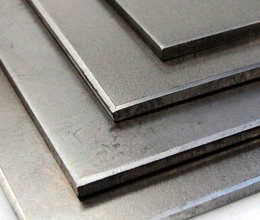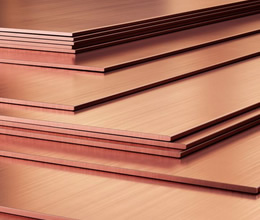Standard and Exotic Metals
Fabcor is a diversified custom contract fabricator focused on producing high quality, close tolerance parts and assemblies. We are certified to weld aluminum, stainless steel, carbon and nickel alloys, as well as exotic metals, such as Inconel, Monel, Hastalloy, and Titanium. Our quality control is in compliance with ISO 9001:2015. A few welding certifications we hold are AWS D17.1, D1.1, D1.2, D1.6. Materials we work with include Aluminum (5052, 6061, 2024, 7075 alloys), Mild Steel Cold Rolled (24 ga to 11 ga), Hot Rolled (10 ga to one inch), Stainless Steel (300 series at any hardness, 17-7 ph, 17-4 ph, 13-8 ph, 15-5 ph), Titanium, and Copper.



Exotic Metals We Are Familiar With
Nickel
Nickel and nickel alloys are used for a wide variety of applications that involve corrosion resistance and/or heat resistance. Nickel-copper alloys possess excellent corrosion resistance in harsh chemical environments. In sea water they deliver excellent service in applications such as nuclear submarines and various surface vessels.
Nickel-base alloys are used in many applications where they are subjected to harsh environments at high temperatures. Nickel-chromium alloys or alloys are used to provide both oxidation and carburization resistance at high temperatures. Nickel alloys are using in industrial and marine applications such as pump impellers for oil refining, pressure vessels, distiller tubes, ferrules, heat exchanger tubes, condenser plates, condensers, evaporators, valve bodies, hot water tanks, water hoses, tube sheet for salt water service, ship hulls, propeller sleeves, salt water pipe fittings, salt water piling wrap, salt water baffles, and salt water piping systems.
Chromium
Chromium can be used to replace some of the iron content and at one per cent or more provides higher strength. It is often used as a nickel casting alloy. A low-chromium nickel wrought alloy has been developed in the USA.
Hastelloy
The corrosion resistant Hastelloy alloys are widely used by the chemical processing industries. The need for reliable performance leads to their acceptance and growth in the areas of energy, health and environmental, oil and gas, pharmaceutical and flue gas desulfurization industries. The attributes of Hastelloy alloys include high resistance to uniform attack, outstanding localized corrosion resistance, excellent stress corrosion cracking resistance, and ease of welding and fabrication.
Haynes
Haynes alloy is an nickel-molybdenum chromium alloy which derives its strength from a long range ordering reaction upon aging. It has superior tensile strength which are as much as double those for solid solution strengthened alloys but with high ductility in the aged condition. The thermal expansion characteristics of Haynes are much lower than those for most other alloys, and it has very good oxidation resistance. Other attractive features include excellent low cycle fatigue properties, very good thermal stability, and resistance to high-temperature fluorine and fluoride environments.
Inconel
Inconel is a nickel-chromium alloy used for applications that require corrosion and high temperature resistance. This nickel alloy was designed for elevated temperatures in the range of 2000° F. It is non-magnetic, has excellent mechanical properties, and presents the desirable combination of high strength and good weldability under a wide range of temperatures. The high nickel content in Inconel enables it to retain considerable resistance under reducing conditions, makes it resistant to corrosion by a number of organic and inorganic compounds, gives it excellent resistance to cracking. Inconel has excellent resistance to alkaline solutions. Typical applications of this nickel alloy include the chemical, pulp and paper, aerospace, nuclear engineering and heat treating industries.
Invar
Invar is an austenitic nickel-iron alloy. Invar has an extremely low coefficient of thermal expansion. Invar is used in the aerospace composite tooling and die markets, and other industrial applications where demanding conditions require minimum thermal expansion and high dimensional stability.
Invar is noted for its uniquely low coefficient of thermal expansion, most commonly used in the Aerospace industry. It has good fatigue and mechanical properties at cryogenic temperatures. It has moderately high strength along with good ductility and toughness. Invar can be welded using filler wire with expansion rates similar to those of the base metal.
Manganese Bronze
Manganese is invariably present in the commercial alloys as a de-oxidant. It improves working characteristics and additionally contributes to corrosion resistance in seawater. Industrial applications include: clutch bearings, shaft bushings, propeller shafts, sleeve bearings, thrust bearings, pump parts, seal rings, spindles, idler pins, drive shafts, piston head, bearings, bushings, pins, wear plates, gears, cams, connecting rods, marine hardware, marine valve seats
Monel
Monel is a basic nickel-copper alloy widely used where superior corrosion resistance and moderate high or low temperature properties are needed. Impact test shows Monel is very tough. Monel has structural strength yet is ductile and has excellent corrosion resistance in most environments. Conventional shop working practices can be used to fabricate Monel.
Typical uses for Monel include: chemical, electrical and marine field tanks, heat exchangers, diaphragms, connectors, valves, pump shafting and hardware.
Other Less Used Exotic Metals
Tantalum
Tantalum is used in electronic components, chemical equipment, missile technology, and nuclear reactors. The electronics industry consumes the majority of tantalum produced for capacitors. Other industries concerned with corrosion, especially the chemical processing industry are accounting for an increasingly larger percentage of the market. Tantalum can be used to fabricate valves for corrosive liquids and to manufacture heaters for acids and heat shields for rocket motors.
Tantalum works similar to copper in forming operations. It can be cold formed in both the grain direction and in the cross grain direction. It can be spun, drawn, and rolled. Like copper, it work-hardens and when this occurs, it requires annealing in inert gas or a vacuum before further working.
Tungsten or Wolframite
Tungsten can be fabricated into many shapes and configurations. It can be folded, bent, formed, spun, flow-turned, sheared, stamped, punched, and riveted. Tungsten is strong, hard, and crack sensitive. Tungsten is usually brittle at room temperature. Fabricating with tungsten requires special handling and skill.
Tungsten can be welded to itself however, the weldm is always recrystallized and brittle. If a leak-tight high temperature joint is required welding is the only solution. For joints that do not have to be leak tight but require good high temperature mechanical strength, use either tungsten or tantalum rivets.
Waspaloy
Waspaloy is a nickel base alloy with good strength and oxidation resistance at high temperatures. I is available in wrought forms as bar, sheet and forgings. Commonly used welding methods work well with this alloy. Matching alloy filler metal should be used. If matching alloy is not available then the nearest alloy should be used. All weld beads should be slightly convex. It is not necessary to use preheating. Surfaces to be welded must be clean and free from oil, paint or crayon marking.
Waspaloy has good ductility and may be readily formed by all conventional methods. Because the alloy is stronger than regular steel it requires more powerful equipment to accomplish forming. Heavy-duty lubricants should be used during cold forming. It is essential to thoroughly clean the part of all traces of lubricant after forming as embrittlement of the alloy may occur at high temperatures if lubricant is left on.
Zirconium
Zirconium is used widely in many industries for process equipment. Major applications include pressure vessels, heat exchangers, piping, tanks, shafts, mixers, and other mechanical equipment; valves; pumps; spargers; trays; and tower packing.
Zirconium often is chosen for its resistance to corrosion from most organic and inorganic acids, salt solutions, strong alkalis, and some molten salts. It is especially suitable in many sulfuric, nitric, hydrochloric, and acetic acid applications. Zirconium is readily welded using practical inert gas fusion welding techniques such as gas tungsten arc welding and plasma arc welding.
